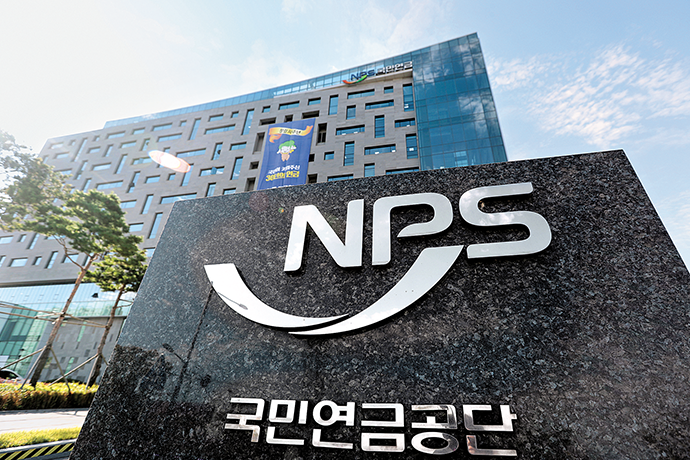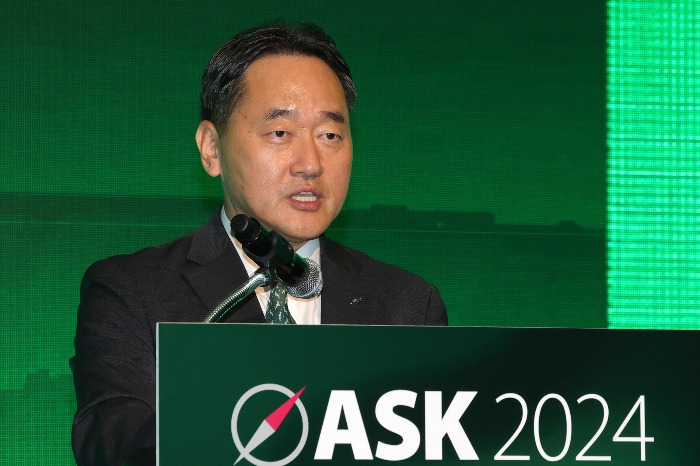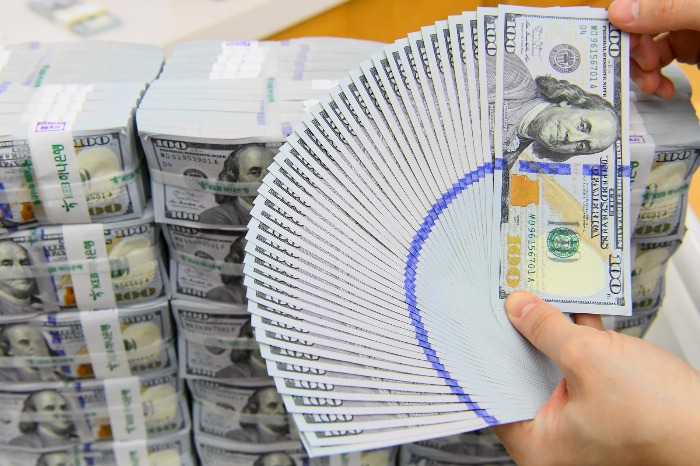Korea mulls tripling NPS advance dollar funding limit
The funding limit differs from the forex swap deal with the Bank of Korea using BOK's forex reserves
By 3 HOURS AGO
Hanwha Systems signs $867 million missile radar deal with Saudi Arabia


NPS-backed new prime office building in Seoul struggles with poor demand


KoreaŌĆÖs POBA to invest $109 mn in KoramcoŌĆÖs office REIT


S.Korea's LS Materials set to boost earnings ahead of IPO process


Jollibee to acquire KoreaŌĆÖs Compose Coffee in $340 mn deal



South Korea is considering tripling the maximum amount of dollars the National Pension Service (NPS) can buy from the domestic foreign exchange market for advance funding to $3 billion a month to mitigate its impact on the local financial market, according to welfare and finance ministry officials on Tuesday.
The Ministry of Health and Welfare, overseeing NPS, is discussing with the Ministry of Economy and Finance to raise the upper limit of its monthly dollar purchases to $3 billion from $1 billion, excluding dollar buying for settlement purposes.
"As NPS is increasing overeseas invsetments, so is its dollar demand," said a welfare ministry official.
ŌĆ£We are seeking to expand the advance dollar funding limit as a means to minimize NPS' influence on the foreign exchange market,ŌĆØ he told The Korea Economic Daily.
The government wants the worldŌĆÖs No. 3 pension scheme to spread out dollar purchase over a longer period, instead of buying the US currency in a lump to settle deals.
Since October of last year, the pension plan has been allowed to secure up to $1 billion for advance funding purposes on a monthly basis.
Previously, it had been barred from securing dollars at home for pre-funding. Thus, it had to make massive dollar purchases to execute offshore investments, putting a downward pressure on the won.
The increase in the upper limit on advance dollar funding will likely come into effect shortly after getting a nod from the National Pension Service Investment Management committee as early as next month, the sources said.
That is different from the foreign currency swap agreement signed with the Bank of Korea (BOK), under which NPS is allowed to tap BOKŌĆÖs foreign exchange reserves.

A finance ministry official said it is in early stages of discussions with the welfare ministry about raising NPS' advance dollar purchase limit and it will be adjusted in consideration of the average amount of NPS' dollar purchase.
NPS buys $2 billion-$3 billion in dollars a month from the domestic forex market on average, including those for advance funding.
The average daily balance of its foreign currency holdings stands at $600 million in the second quarter of this year.
ŌĆ£If the advance funding limit is upped to match its monthly overseas investments of 2 to 3 billion dollars, its impact on the foreign exchange market will be reduced,ŌĆØ the welfare ministry official explained.
The won has been on a downward trend since the start of this year. In April, it hit a 17-month low of 1,400 won per dollar. On Tuesday, the Korean currency ended domestic trade at 1,390.6 to the greenback.

With a rise in its dollar purchase limit, NPS will be able to buy dollars on the dip and beef up investment returns. It will also be able to meet capital calls from foreign asset managers in a timely manner.
That compared with its overseas asset holdings of 256.8 trillion won as of the end of 2019, or 34.9% of its portfolio.
NPS plans to further raise its exposure to overseas assets to about 60% by 2028, according to its medium-term investment plan released by the welfare ministry in October of last year.
INVESTMENT RETURNS
Global portfolios significantly outperformed domestic ones.
NPS earned a 11.96% return from overseas stocks between 2021 and 2023 on average, much higher than the 0.21% gain from domestic stocks during the same period.
Global bonds yielded a 3.47% return during the period, outperforming the 0.15% return on domestic bonds.
A 1-percentage-point rise in investment returns will likely delay the depletion of the pension fund by five years, currently expected to run out of funds by 2055, according to the welfare ministryŌĆÖs forecast released last year.
Meanwhile, NPS agreed last month to raise the upper limit of currency swap lines with the Bank of Korea to $50 billion from $35 billion through the end of this year.
A government official said the increased currency swap lines would likely remain in place beyond the pre-agreed period, unless the domestic dollar/won rate stabilizes by the end of this year. ┬Ā
Write to Se-Min Huh and Jung-Hwan Hwang at semin@hankyung.com
Yeonhee Kim edited this article
-
 Pension fundsNPS commits $723 mn to MBK, 3 other managers for Korean PEs
Pension fundsNPS commits $723 mn to MBK, 3 other managers for Korean PEsJul 15, 2024 (Gmt+09:00)
2 Min read -
 Pension fundsSamsung, SK Hynix lead value increase in Korea NPS' local shares in Q2
Pension fundsSamsung, SK Hynix lead value increase in Korea NPS' local shares in Q2Jul 10, 2024 (Gmt+09:00)
2 Min read -
 Pension fundsNPS overweight in beauty, food; chases APR, Samwha higher
Pension fundsNPS overweight in beauty, food; chases APR, Samwha higherJul 05, 2024 (Gmt+09:00)
1 Min read -
 Real estateNPS-backed new prime office building in Seoul struggles with poor demand
Real estateNPS-backed new prime office building in Seoul struggles with poor demandJul 05, 2024 (Gmt+09:00)
2 Min read -
 Pension fundsNPS to cut global stocks under GP management, up its direct control
Pension fundsNPS to cut global stocks under GP management, up its direct controlJul 02, 2024 (Gmt+09:00)
1 Min read -
 Foreign exchangeKorea FX authorities, NPS raise currency swap limit to $50 bn
Foreign exchangeKorea FX authorities, NPS raise currency swap limit to $50 bnJun 21, 2024 (Gmt+09:00)
1 Min read -

-
 Pension fundsNPS logs 5.8% return in Q1 led by US tech stock rally
Pension fundsNPS logs 5.8% return in Q1 led by US tech stock rallyMay 30, 2024 (Gmt+09:00)
1 Min read -
 Pension fundsNPS to spur buyout, VC in US tech sector: chairman
Pension fundsNPS to spur buyout, VC in US tech sector: chairmanMay 21, 2024 (Gmt+09:00)
1 Min read -
 Pension fundsNPS to hike risky asset purchases under simplified allocation system
Pension fundsNPS to hike risky asset purchases under simplified allocation systemMay 02, 2024 (Gmt+09:00)
2 Min read -
 Pension fundsNPS to commit $1.1 billion to external managers in 2024
Pension fundsNPS to commit $1.1 billion to external managers in 2024Apr 28, 2024 (Gmt+09:00)
2 Min read


